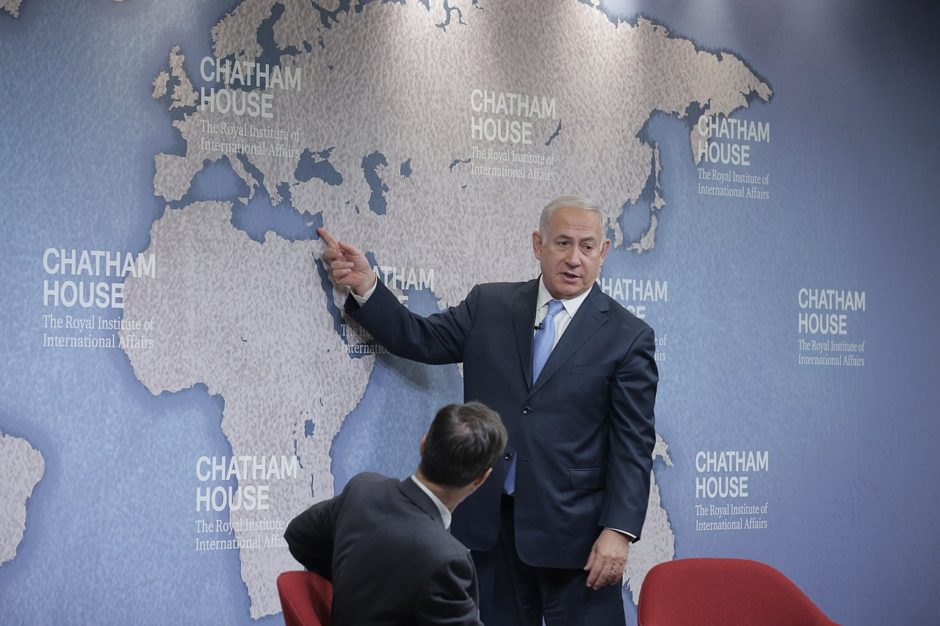
When the Israeli journalist Anshel Pfeffer was researching his now-published biography of Benjamin Netanyahu, he requested interviews with him. All his requests, formal and informal, were ignored. But when Pfeffer — the Israel correspondent of The Economist — and senior editors of the British magazine met Netanyahu in his office one day, the Israeli prime minister turned to Pfeffer’s bosses and said, “This is Mr. Pfeffer who’s writing a book about me. He doesn’t know anything about me. It will be a cartoon.”
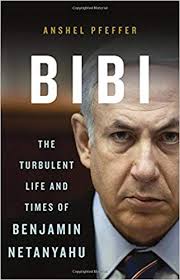
Netanyahu’s putdown of Pfeffer’s forthcoming volume was rooted in his belief that it would be critical of his policies and leadership. Having read Bibi: The Turbulent Life and Times of Benjamin Netanyahu (McClelland & Stewart), I beg to differ with his flippant assessment. This is a carefully-constructed, thoughtful and nuanced account of Israel’s youngest and first Israeli-born leader. Exquisitely balanced rather than hagiographic, it’s sweeping in content and a most valuable contribution to Israeli historiography.
In his prologue, Pfeffer offers a thematic overview: “Netanyahu’s Israel enjoys an American-style standard of living while keeping its immediate neighbors under military occupation … (Israel) is a hybrid society of ancient phobias and high-tech hopes, a combination of tribalism and globalism — just like Netanyahu himself.”
Although a Sabra, Netanyahu comes from a long line of East European Jews. His grandfather, Nathan Mileikowsky, was born in what is now Belarus in 1879. He changed his surname to Netanyahu (“given by God”) while writing a newspaper column. Netanyahu’s father, Benzion, was born in Warsaw in 1910.
Nathan, a Zionist who blended Jewish nationalism with religious tradition, settled in Palestine with his family in 1920. He held a variety of jobs — school principal in Safed, Zionist administrator in Jerusalem and farmer in Herzlyia. He died in 1935. His son, Benzion, joined the right-wing Revisionist movement, thereby becoming an outsider in the eyes of mainstream Zionists. Appointed an editor of the Revisionist house organ, Ha’ Jarden, which promoted the notion that a Jewish state should be established on both sides of the Jordan River, he was very skeptical of the Zionist leadership and its socialist principles and dismissed one of his rivals, Menachem Begin, a future prime minister, as a charlatan devoid of intellectual depth.
Ze’ev Jabotinsky, the founder of the Revisionist strain of Zionism, personally appointed Benzion to represent the movement in the United States. In 1944, he married Tzila Segal, with whom he had been in love for a decade. She encouraged him to pursue his academic interest in the Spanish Inquisition and the expulsion of Jews from Spain.
They returned to Israel in the autumn of 1948, toward the close of the first Arab-Israeli war, even though he had little faith in the new state’s ability to survive and prosper in the face of Arab enmity. Netanyahu, the second of three sons, was born in Tel Aviv on October 23, 1949. Benzion expected to play a leading role in the Herut Party, led by Begin, or be offered a spot on the party’s list of candidates for the Knesset. But neither scenario materialized, prompting him to give up on politics and focus on his academic career.
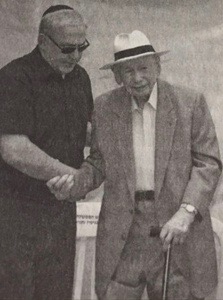
Pfeffer demolishes the myth, propagated by the Netanyahu clan, that his prospects in Israeli academia were blocked by his political views. “Although it is undoubtedly true that a majority of senior professors at Hebrew University and the new Israeli universities were and remain on the left in their politics, there was no shortage of upcoming academics on the right,” he writes, citing scholars such as Yossef Rivlin, Benjamin Akzin and Haim Beinart.
Denied a university position, Benzion toyed with the idea of returning to the United States, but chose to stay in Israel because his mentor, Joseph Klausner, handed him the editorship of the Encyclopedia Hebraica, a task he performed at home. Closeted in his study for much of the day, he was a virtual shut-in. “Our mother raised us,” Netanyahu would later say.
Accepting a fellowship from Dropsie College, from which he had obtained his PhD, Benzion moved back to the United States in 1958, his family in tow, but returned to Israel two years later. Due to quarrels with the publishers and editors of the Encyclopedia Hebraica, Benzion was eased out of his position. While Benzion remained detached from Israeli society, his three sons — Benjamin, Iddo and Jonathan (Yoni) — fit in snugly.
Once again, they packed their bags, bound for the United States. In the next few years, Benzion would teach Jewish history and Hebrew literature at the University of Denver and Judaic studies at Cornell University.
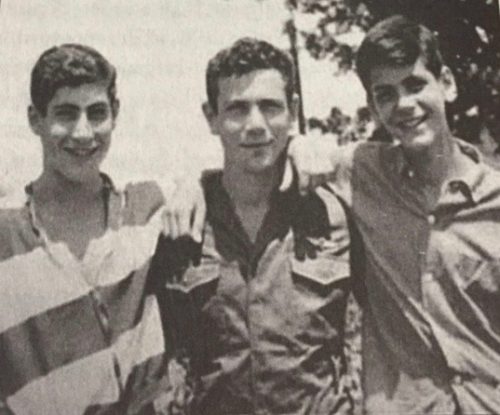
According to Pfeffer, Benzion had no alternative but to leave Israel. “Past 50, he was still stymied in his academic career. America offered the prospect of tenure and uninterrupted time to research the origins of the Spanish Inquisition.” As well, he notes, Benzion believed his sons could obtain a better education in the United States.
“On a subconscious level, however, it seems that life in the Jewish state, which he had worked for and yearned for, but under a socialist government that he abhorred and was convinced could not save the state from ultimate destruction, was unbearable. He would return to live in Israel permanently only under a Likud government. Benzion was incapable of identifying with his sons, who felt that by leaving Israel they were abandoning the Zionist enterprise that was central to their self-identity.”
In effect, his sons resented him for uprooting them from Israel and for trying to dissuade them from joining the Israeli army.
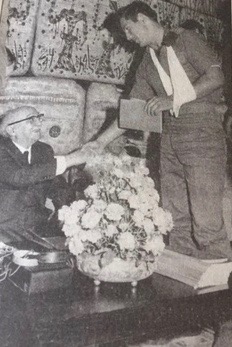
Netanyahu enlisted shortly after the Six Day War and joined the special Sayeret Matkal commando unit. He got his first taste of war on March 21, 1968, when the Israeli army launched a raid against Karameh, a village in Jordan that had been commandeered by the PLO. He also participated in the attack on Beirut Airport on December 28, 1968 and in a raid into Egypt the following year. In 1972, he was a member of a team that captured a Sabena passenger plane that had been hijacked by Palestinians and forced to land in Ben-Gurion Airport. During the Yom Kippur War, he commanded a still secret operation that unfolded in the north.
He left the military to marry Miriam Haran, the first of his three wives, and to acquire a formal education. While she studied organic chemistry at Brandeis University, he enrolled at the School of Architecture and Planning at the Massachusetts Institute of Technology. During this period, when he was known as Ben Nitay, he began a master’s degree at MIT’s Sloan School of Management.
Netanyahu became a political activist by handing out pro-Israel leaflets on campus. He was soon delivering lectures on Israeli current affairs at synagogues and Jewish federations. By Pfeffer’s reckoning, Colette Avital, the Israeli consul in Boston, was the first Israeli diplomat to see the potential in Netanyahu. She sent him on his first official speaking engagements and appearances on local television stations, for which he was paid $25 a lecture. Ironically, Avital, a Labor Party loyalist, was forced out of the foreign service during Netanyahu’s first term as prime minister.

By then, Netanyahu had formed his hardline views of the Arab-Israeli conflict. On Yoni’s recommendation, he had read Ayn Rand’s novel, The Fountainhead. “Rand’s muscular blend of capitalism and individualism appealed to Netanyahu and has influenced his political and economic thinking ever since,” says Pfeffer.
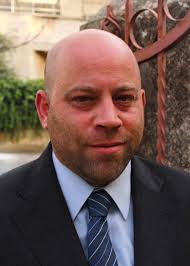
The worst experience of his life took place shortly after Israel’s 1976 Entebbe raid, when he had to break the horrible news to his parents that Yoni, his oldest brother and soulmate, had been killed during the audacious operation. “Entebbe would irrevocably change his life,” says Pfeffer.
Given his flair for public relations, Netanyahu transformed Yoni into a full-blown hero. As Pfeffer puts it, “Israel devotes great resources to preserving the memory of fallen (Israeli) soldiers. Yet no other Israeli soldier has ever been accorded anything like the praise and commemoration that Yoni Netanyahu has received.”
The next chapter in the Netanyahu saga occurred when he returned to Israel in 1978 and spent months looking for work. He finally landed a position as the marketing manager of a furniture company. His second wife, Fleur, found a job in the high-tech industry.
Netanyahu’s big break came when Moshe Arens, Israel’s new ambassador to the United States, appointed him as his deputy. Arens was looking for someone who could hold his own on talk shows and charm pundits.
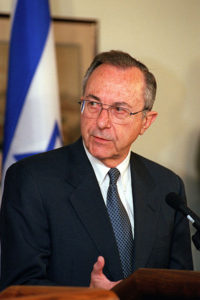
Another patron was Shimon Peres, the Labor Party politician who admired Yoni. In 1984, when he was prime minister, Peres appointed Netanyahu, a fluent English speaker, as ambassador to the United Nations. Subsequently, he was named deputy foreign minister. But after he denounced U.S. policy in the Middle East, he was declared a persona non-grata at the State Department in Washington.
Netanyahu leapt into Israeli politics in 1993 when he was elected leader of the Likud Party. Shortly afterward, his book, A Place Among the Nations, was published. “It remains one of the most comprehensive, if extremely biased, examinations of Israel and the case for Zionism,” says Pfeffer.
In his book, Netanyahu compares the Zionist quest to return to the Land of Israel to the Christian reconquest of Spain. He claims that the Arabs in Palestine were mainly nomads or recent arrivals. He says that real peace, a peace of deterrence, will only be possible when the Arabs recognize Israel’s right to exist. He contends that Israel cannot relinquish control of the West Bank and the Golan Heights. The Palestinians, at most, can be offered limited autonomy. He insists that the Palestinian issue is a distraction from the real issues in the Middle East.
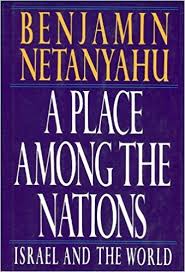
“Over the years, Netanyahu has been forced to publicly jettison some positions and present a more pragmatic image,” Pfeffer says. “In his actions, he has remained resolutely doctrinaire.”
As opposition leader, Netanyahu lambasted the Oslo accord, likening it to the 1938 Munich agreement. After his election as prime minister in 1996, a victory he won by the skin of his teeth, he promised to abide by the terms of the agreement. But he did not trust Yasser Arafat, the PLO chieftain, and he was certain the peace process would founder on the shoals of Palestinian intransigence.
Netanyahu did not use the incendiary language of the far-right to denounce the prime minister, Yitzhak Rabin, but he continued to appear at anti-Oslo rallies where calls for his murder were heard. In the wake of Rabin’s assassination he was widely seen as an inciter. Rabin’s widow, Leah, let it be known he was not welcome to visit her home to pay his condolences.
Under intense pressure, Netanyahu finally agreed to meet Arafat, his nemesis. After their discussion, he outlined the three elements of his policy toward the Palestinians: reciprocity, security and prosperity. Pfeffer offers a skeptical interpretation of Netanyahu’s position: “His demands for reciprocity and security arrangements would stymie the development of any meaningful agreement moving forward, and the promise of economic prosperity for the Palestinians became a substitute for actual statehood.”
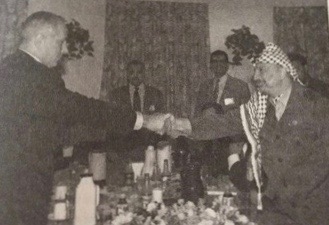
As Netanyahu would later say, “A Palestinian state means no Jewish state and a Jewish state means no Palestinian state.”
Despite his profound reservations about Palestinian leaders, he withdrew from 80 percent of the West Bank city of Hebron. “For the first time, a Likud prime minister had ordered Israeli troops to pull out from part of the historical Land of Israel and allowed the Palestinians to take control of a piece of the historical Jewish homeland,” writes Pfeffer.
Netanyahu, however, sabotaged the Wye agreement, which required Israel to withdraw from 13 percent of the West Bank.
With respect to the Golan Heights, captured by Israel during the Six Day War, Netanyahu told U.S. diplomats he would be willing to pull back to the ridgeline, but would not permit a full withdrawal. The Syrian president, Hafez al-Assad, could not accept this concession.
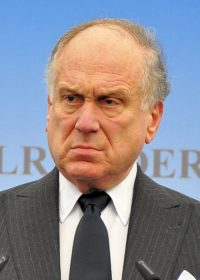
In 1998, Netanyahu dispatched his American Jewish friend, Ronald Lauder, to negotiate with Assad. They met nine times and agreed that the new border would be “on the line of June 4, 1967,” as Syria demanded. The Syrians asked for a map, but one was never sent, and Lauder wound up his mission.
Netanyahu went down to defeat in the 1999 election, handily beaten by Ehud Barak, the former chief of staff of the Israeli armed forces. He embarked on the lecture circuit, earning as much as $60,000 for a single appearance. His lucrative fees enabled him and his third wife, Sara, to buy a seaside villa in Caesarea and indulge in a hedonistic lifestyle totally at odds with the frugality of Begin and David Ben-Gurion, Israel’s first prime minister.
Pfeffer thinks Netanyahu turned in a stellar performance as finance minister. A firm believer in open markets and small government, he liberalized the economy. “Netanyahu deserves credit for helping to create the conditions for Israel’s speedy recovery from recession, continuing the liberalization of its financial markets and boosting the prosperity that was a factor in cushioning (Israel) from the local downturn from late 2008.”
Netanyahu privately opposed Ariel Sharon’s unilateral withdrawal from the Gaza Strip in 2005. In public, he gave the plan his qualified and grudging support.
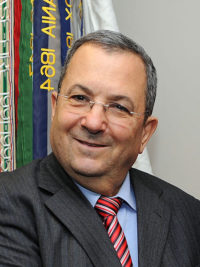
Following Sharon’s stroke in the same year, Netanyahu regained the leadership of the Likud Party. Within four years, he was prime minister again. Netanyahu retained Ehud Barak, who had ended his first term, as minister of defence. They worked harmoniously, but their relationship would deteriorate.
To Pfeffer, Netanyahu and the U.S. president, Barack Obama, were on a “collision course” from almost the outset. Obama pressured him to announce a partial freeze on the construction of settlements in the West Bank and endorse a two-state solution. By Netanyahu’s standards, these moves were radical. In reality, his “core policy” remained unchanged. He never fleshed out the details of a demilitarized Palestinian state, the Likud platform continues to oppose Palestinian statehood, and Netanyahu has fenced off Israel from its Arab neighbors by building security barriers.
Netanyahu preferred to concentrate on the threat posed by Iran, which, he claimed, was the new incarnation of Nazi Germany. To the Obama administration, Iran was certainly dangerous. But in Obama’s mind, Iran was ultimately Netanyahu’s “excuse to avoid dealing with the Palestinians.”
Israel, threatening to bomb Iran’s nuclear facilities, assassinated several of its scientists and diverted shipments of Iranian military and nuclear materials. Israel’s aggressive rhetoric, combined with its tangible actions, induced the United States to partner up with it to sabotage Iran’s nuclear program. The Stuxnet computer virus, jointly developed by the two countries to destroy Iran’s uranium enrichment centrifuges, was an example of this cooperation.
As Pfeffer points out, Obama was not the only one who resisted Netanyahu’s scheme to attack Iranian nuclear sites. Meir Dagan, the director of the Mossad, also saw Iran as a mortal threat to Israel. But he thought that Israel should wage a clandestine war against Iran rather than resort to a military strike. The chief of staff, General Gabi Ashkenazi, concurred with Dagan.

Pfeffer credits Netanyahu with having developed the policy of keeping Hezbollah in check. In 2013, when Syria was embroiled in a civil war, Israel launched the first in a series of air strikes on Hezbollah convoys and storage sheds in Syrian territory. Under his “red lines” system, Hezbollah would neither be permitted to acquire advanced weapons nor to entrench itself militarily on the Golan Heights. And Israel would respond forcefully to Hezbollah aggression.
Netanyahu has twice gone to war with Hamas in the Gaza Strip, but in Pfeffer’s judgment, he is still averse to large-scale military adventures there.
Unlike most of his predecessors, Netanyahu is not seeking to achieve a diplomatic breakthrough with the Palestinians. Like the late Yitzhak Shamir, he wants to preserve the status quo. When Israel entered into what would be unsuccessful bilateral peace talks with the Palestinian Authority in 2013, Pfeffer notes, Netanyahu refused to commit to fixed borders. Nor would he present the Americans with a map marking out proposed territory and borders for a two-state solution.
As Pfeffer writes, “The only peace he has been willing to consider is one where Israel bullies the Palestinians into submission. Until that happens, he will continue building walls.”
In his view, Netanyahu has failed to make the case internationally for keeping the settlements, but he has succeeded in “taking the settlements off the global agenda” and demonstrating that Israel’s conflict with the Palestinians is not at the root of the problems in the region.
Israel’s occupation of the West Bank is eroding Israeli democracy and human rights “at an alarming rate.” But Netanyahu has no plan to deal with that, “save for stoking racism and fear.”
As far as Israel’s relations with the Diaspora are concerned, Netanyahu has developed a “deep disdain” for liberal American Jews who criticize his policies. “In private, he has agreed with the assessment that they will eventually assimilate and disappear.”
Netanyahu may yet have to resign due to corruption scandals, but at present, “he sees no one capable enough or worthy of replacing him.” He regards any challenge to his leadership as a threat to Israel’s national security.
Israel’s economy has never been stronger, but he has done nothing to address the growing inequality in the country.
In closing, Pfeffer sounds a bleak note. Netanyahu’s “ultimate legacy will not be a more secure nation, but a deeply fractured Israeli society, living behind walls.”
